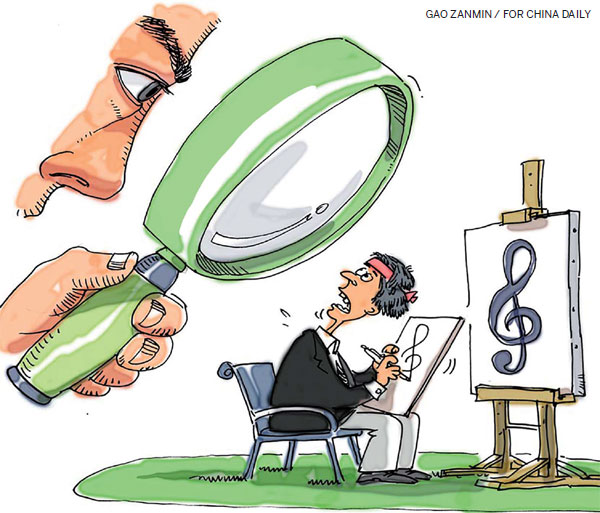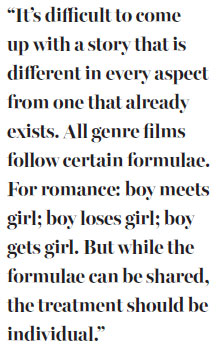Inspiration or imitation?
Updated: 2016-07-08 08:11
By Raymond Zhou(China Daily Europe)
|
|||||||||
Row over writing credit shows the fine line that all filmmakers must tread
Zhang Muye, a best-selling author, sued the people behind a film adaptation of one of his novels last month. He accused the producers of last year's Chronicles of the Ghostly Tribe of offenses that included not giving him sufficient credit and drastically deviating from his original text.
The movie does open with a line that states it is based on volume one of The Adventures of Three Tomb Raiders, but no mention is made of Zhang, who released the book under the pen name Tianxia Bachang.

On June 28, a Beijing court agreed this was insufficient and ordered the filmmakers to add the author's name to the credits. Yet it ruled against his claim that the defendants owed him 1 million yuan ($150,000; 134,000 euros) in compensation for butchering his story, saying instead that producers have the right to make changes to the source material.
Ghostly Tribe was the first of two adaptations of the best-selling book in 2015. The other was Mojin - The Lost Legend, for which Zhang helped with the screenplay. This came about because the rights to the first four volumes were sold to one buyer while the rights to the final four were sold to another.
Both movies veered drastically from the novel, with the screenwriters on each giving the same reason: First, Chinese regulators don't allow movies to contain supernatural phenomenon or illegal activities like tomb raiding; and second, the episodic narration in the novel does not lend itself to a feature film.

Mojin does actually contain tomb raiding, but the heroes are thrust into it by circumstance. Meanwhile, Ghostly Tribe, directed by Lu Chuan, keeps the three main characters in the book, but it has a new story, which upset fans of Zhang's original.
In 1981, Xu Mao and His Daughters, another hit novel, also spawned two screen adaptations, both made by state-owned studios in Beijing. However, only one had the author's approval. Ironically, the unlicensed one was seen to have higher artistic merit.
The fact both screen versions of The Adventures of Three Tomb Raiders were properly licensed is testament to the progress China has made in intellectual property protection. There are even signs the pendulum may have swung a little too far to other way.
When director Zhang Yimou released A Simple Noodle Story in 2009, he called it a remake of the Coen brothers' Blood Simple. In 2011, I asked Joel Coen about this at a Beijing forum. He told me that when he watched the Chinese movie, at first he detected no similarity with his own movie, yet as the story unfolded he recognized the narrative arc. "It was my single weirdest viewing experience," he said.
I've always suspected that Zhang or his production company paid the licensing fee more or less as a marketing expense. He must have foreseen the negative reviews and hoped the source material could be one of the things he could use as a defense. He knew that most film critics loved the Coens' work.
I wonder what would have happened if Ghostly Tribe had not used the characters' names from the novel or bothered with the licensing agreement. Would the director have had more creative freedom and come up with a better story? Would the film have ended up with lower box-office receipts because the fans would not have shown up?
Let's take a step back and examine the Monkey King story, which is in the public domain and needs no prior approval for an adaptation. If I create a new story with a mischievous monkey, should I say it's based on the age-old legend?
It's difficult to come up with a story that is different in every aspect from one that already exists. All genre films follow certain formulae. For romance: boy meets girl; boy loses girl; boy gets girl.
But while the formulae can be shared, the treatment should be individual.

Take a buddy film, for instance. When Xu Zheng and Wang Baoqiang were first paired in 2010's Lost on Way, it was uncomfortably reminiscent of Planes, Trains and Automobiles, a 1987 Hollywood comedy this is unknown to most in China. Later, its makers acknowledged the source, although the jokes had been reworked for Chinese audiences.
I often think this film could have landed in legal trouble had the Hollywood side learned about it, or had it had been a financial success.
I've also heard it said that Lost in Thailand, the supposed sequel to Lost on Way, borrowed liberally from The Hangover Part II, but that view isn't widely supported in China. The only similarity, it seems, is both comedies are set in Thailand and involve friends.
Lost in Thailand actually landed in legal trouble due to the producers marketing it as a sequel, despite Lost on Way being made by a different studio. Saying it is a sequel would be like hiring Daniel Craig for a spy thriller in which he doesn't play James Bond but still calling it a Bond movie.
The biggest such controversy surrounded last year's sleeper hit Goodbye Mr Loser. After making 1.4 billion yuan at the box office, one critic said it had plagiarized from Peggy Sue Got Married, the Francis Ford Coppola movie. The filmmakers denied they'd ever seen the 1986 film and sued the critic for defamation.
The case is still pending, but I believe the filmmakers. The two stories share a premise of protagonists being transported back in time, but so does Back to the Future. Oh, there is similarity in detail: A character writes a song that ends up as a seminal work for a big star. But a good comedy needs 100 details like that. I'd call it a coincidence if it contains just one or a few.
When I finish a script, I often change my perspective to that of a critic and will find a dozen or more sources of inspiration for the work. I will mention them in a published article so smart people won't think I'm stealing.
Acknowledging one's sources is a sign of honesty and also an effort to differentiate faithful adaptation and free association and the 100 shades in between.
Contact the writer at raymondzhou@ chinadaily.com.cn
(China Daily European Weekly 07/08/2016 page22)
Today's Top News
Britain set for its second female prime minister
UK Iraq report highly critical of Tony Blair
UK invasion of Iraq was not last resort: Report
Berlusconi accepts Chinese offer for AC Milan
UK consultancy loses license, Chinese graduates being told to leave
Chinese online retailers offer 'Brexit sales' as sterling hits record lows
British PM race cut to 3 hopefuls
Suicide bombers hit three Saudi cities
Hot Topics
Lunar probe , China growth forecasts, Emission rules get tougher, China seen through 'colored lens', International board,
Editor's Picks

|

|

|

|

|

|







